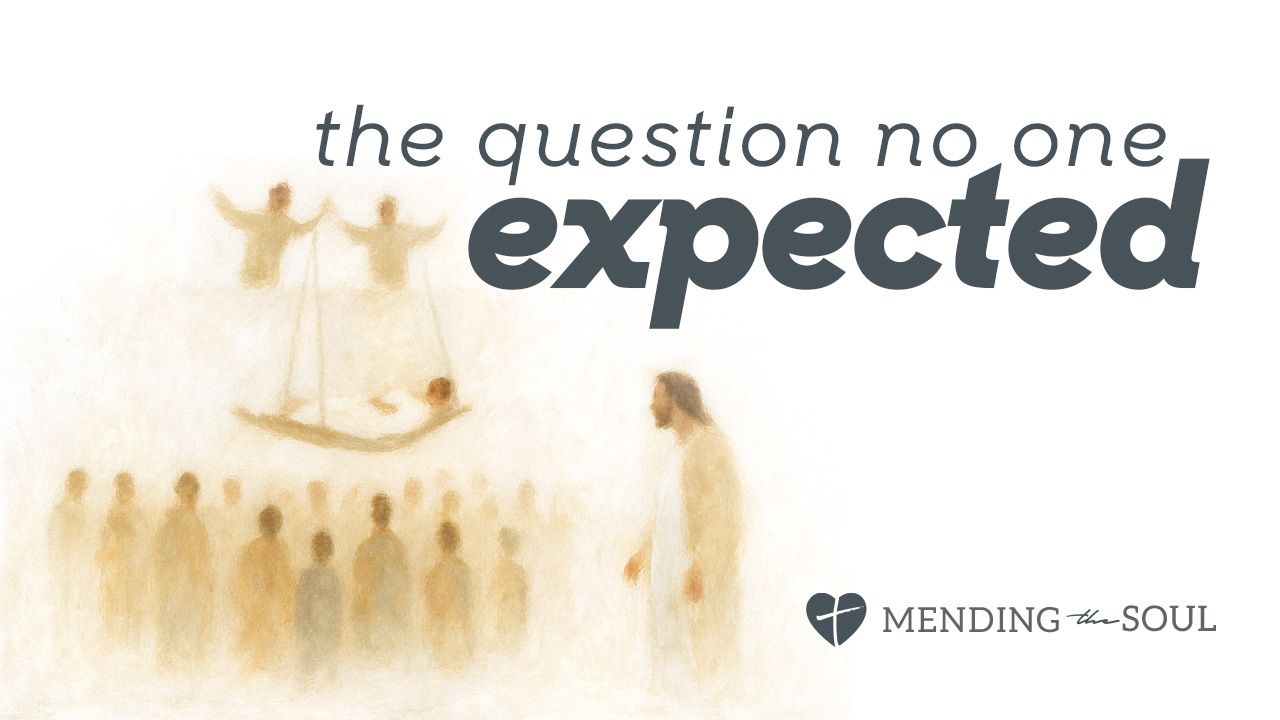The Question No One Expected

Healing was only half the story.
They carried him to Jesus.
Not because they had the right words.
Not because they knew exactly what He would do.
But because they were desperate for something to change.
The man couldn’t walk. Couldn’t stand. Couldn’t move forward on his own. So his friends did what desperate love does—they lifted him, burden and all, and made their way through the narrow streets. When the crowd blocked the door, they didn’t give up. They climbed onto the roof, tore through the clay and thatch, and lowered him into the center of the room.
A quiet gasp must have swept across the crowd. The teachers, the skeptics, the followers all pausing to watch this man descend. Dust in his hair. Shame on his face. Need in his eyes.
A single, unspoken request hung in the air: Make him walk.
The Healer was in the room. The need was obvious. The miracle seemed inevitable.
But Jesus didn’t say what they expected. He didn’t speak to the man’s legs.
He spoke to something far deeper.
“Son, your sins are forgiven.”
The Room Shifted
You could feel it. Like the air had changed.
That’s not what they came for. That’s not what they expected.
But Jesus had never been interested in simply meeting expectations.
He came to do something greater. Something eternal.
The religious leaders were already seething in their hearts.
Who does this man think he is? Who can forgive sins but God alone?
And that’s when Jesus asked the question that cracked the story wide open:
“Which is easier—to say to this man, ‘Your sins are forgiven,’ or to say, ‘Get up, take your mat, and walk’?”
In a room full of people waiting for one kind of miracle, Jesus offered another.
They came to see what He could do.
But He revealed who He is.
We come to Jesus asking for healing of bodies, relationships, circumstances, hearts.
We want breakthrough. We want relief. We want to walk again.
Here is a truth at the heart of Jesus' question: the miracles of healing and forgiveness often feel different.
One speaks to our wounds.
The other speaks to our sin.
Together they confront more than our pain, they confront our theology.
At the heart of Jesus' question lies another question:
"What do we believe is even possible?"
Aspects of Faith
Healing asks us to believe that Jesus can, that He has authority over sickness, suffering, and the fractured places in our lives.
Forgiveness asks us to believe that Jesus is, that He is who He says He is: the Son of God.
At Mending the Soul, we’ve heard it again and again:
“This is the first time I’ve felt safe enough to even think about forgiveness.”
“I thought healing was impossible. Now, I’m starting to believe again.”
“I’m learning that forgiveness lets me breathe again.”
The Journey Is Never Rushed
Forgiveness and healing aren’t always on the same path.
They require different journeys, different timing, and different aspects of faith.
One speaks to the wounds we carry.
The other speaks to the burdens we bury.
One asks us to believe that Jesus has the power to restore what was broken.
The other asks us to believe that Jesus is the One who can carry what we cannot.
The Path to Wholeness Moves in Both Directions
Some of us carry wounds from what was done to us.
Others carry shame from what we’ve done.
Most of us carry both.
But the path to wholeness doesn't ask us to choose.
It leads us through both valleys.
One restores dignity.
The other releases bitterness.
Together, they set the captive free.
Because the same Jesus who said, “Take up your mat and walk,”
also said, “Your sins are forgiven.”
And He meant both.
At Mending the Soul, we walk gently with survivors through the work of healing and spiritual transformation. We never ask people to rush forgiveness. We never treat it as a shortcut to peace. We begin with safety. With story. With sacred space to lament and be believed.
“I didn’t just learn how to heal,” one participant told us. “I learned how to believe I could be whole.”
We begin to forgive.
We begin to trust again.
We begin to believe that we are not beyond grace.
That is how the miracle comes full circle.
The Invitation Still Stands
Jesus’ question still echoes:
“Which is easier: to say, ‘Your sins are forgiven,’ or to say, ‘Get up and walk’?”
He isn’t just speaking to a house full of skeptics.
He’s speaking to us.
Because healing can feel impossible.
And forgiveness, giving it or receiving it, can feel unthinkable.
But to Jesus?
Neither is too much.
Neither is beyond His reach.
Take the next step.
Let Him speak to the part of you that still aches.
Let Him begin the miracle you didn’t even know to pray for.
“Rise. Be free. Walk in wholeness.”
Don’t Settle for Half of the Miracle
Don’t only settle for survival. Don’t silence the story. Don’t stop at half the miracle.
Be bold. Heal deeply. Forgive freely.
